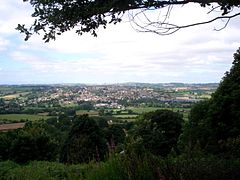Bromyard and Winslow
| Bromyard | |
|---|---|
 View of Bromyard from Bromyard Downs |
|
| Bromyard shown within Herefordshire | |
| Population | 4,500 |
| OS grid reference | SO654548 |
| Civil parish | |
| Unitary authority | |
| Ceremonial county | |
| Region | |
| Country | England |
| Sovereign state | United Kingdom |
| Post town | BROMYARD |
| Postcode district | HR7 |
| Dialling code | 01885 |
| Police | West Mercia |
| Fire | Hereford and Worcester |
| Ambulance | West Midlands |
| EU Parliament | West Midlands |
| UK Parliament | |
Bromyard is a market town in Herefordshire, England, situated in the valley of the River Frome. The latest census gives a population in 2011 of approximately 4,500. It lies near to the county border with Worcestershire on the A44 between Leominster and Worcester. Bromyard has a number of traditional half-timbered buildings, including some of the pubs, and the parish church dates back to Norman times. For centuries there was a thriving and livestock and cattle market. The town is twinned with Athis-de-l'Orne, Normandy.
Bromyard is mentioned in Bishop Cuthwulf's charter of c.840. Cudwulf established a monasterium at Bromgeard behind a 'thorny enclosure' with the permission of King Behrtwulf, King of the Mercians. Ealdorman Aelfstan, the local magnate, was granted between 500–600 acres of land for a villa beside the River Frome. The settlement in the Plegelgate Hundred was allocated 30 hides for 'the gap [in the forest] where the deer play.' The shire court meeting-place was on Flaggoners Green, now a hill in the modern borough. 42 villani (villeins, villagers), 9 bordars (smallholders), and 8 slaves were recorded in the Domesday entry, one of the largest communities in Herefordshire. The first mention of the spelling "Bromyard" was in Edward I's Taxatio Ecclesiasticus on the occasion of a perambulation of the forest boundaries to set up a model for Parlements in 1291. It began to appear regularly in the church and court records of the 14th century.
Like Leominster, Ledbury, and Ross-on-Wye, the town and fair at the manor of Bromyard was probably founded in c1125 during the episcopate of Richard de Capella (1121–1127). As with those other three towns, the bishops of Hereford had had a manor and minster there since Anglo-Saxon times. As at Ledbury the church was collegiate, with an establishment of clergy known as "portioners", but without a master and common seal. Surveys for the bishop made c. 1285 and 1575-80 give valuable information about the town's first few centuries. Bromyard contained 255 burgage and landowner tenancies in the 1280s which paid a total rent of £23 10s 7 1/2d to the bishop. A Toll Shop at Schallenge House ("Pie Powder" from pieds a poudre) was where market tolls were paid and summary jurisdiction dealt out.
...
Wikipedia

